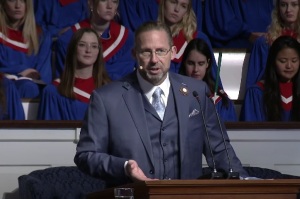The Lord's Supper Helps Christians 'Keep it Real'
As someone who has spent all 47 years of my life in Lutheran churches, I am very familiar with Martin Luther's complex teaching regarding the Lord's Supper. I have seen plenty of people over the years struggle to grasp his puzzling perspective that Christ's literal body and blood are located "in, with and under" the bread and wine. Luther's highly nuanced description of communion 500 years ago was a curious twist on the Roman Catholic position.
This controversial dissection of the elements seems to distort the true meaning of the meal our Lord instituted. It is an unfortunate distraction which takes attention away from the cross where Christ died for sinners. The real purpose of communion as stated in Scripture is to "proclaim the Lord's death until He comes." (1 Cor. 11:26) Amidst the many chains which fell off Martin Luther when he placed his faith in Christ alone, he couldn't seem to shake loose of his Catholic obsession with the communion elements. You won't find this obsession in the teaching of our Lord or His apostles.
Even though the Lutheran church does not teach that believers chew Christ's flesh or swallow His blood at the Lord's Supper, there nevertheless tends to be an enormous emphasis upon "the real presence" of Christ in the bread and wine. In response to Luther's perplexing opinion on this matter, I have often asked people: "What about the real presence of Christ in the heart of every believer 24 hours a day?"
Before Jesus ever instituted the Lord's Supper, He taught what it means to "eat the flesh of the Son of Man and drink His blood." (John 6:53) The words of our Lord in the sixth chapter of the Gospel of John clearly lay out the biblical teaching on this matter. Jesus said, "Whoever eats my flesh and drinks my blood has eternal life, and I will raise him up at the last day. For my flesh is real food and my blood is real drink. Whoever eats my flesh and drinks my blood remains in me, and I in him." (John 6:54-56) This eating and drinking of Christ's flesh and blood is a spiritual eating and drinking. Those who are trusting in Christ and His death on the cross for their salvation are eating and drinking His flesh and blood every hour of every day, which includes those brief moments when they participate in the Lord's Supper.
Religious people who have not been born again through repentance and faith in Christ are not spiritually eating His flesh and drinking His blood. In those instances, their participation in the Lord's Supper provides no spiritual benefits. A preoccupation with "Christ's body and blood" being located in the bread and wine of the Lord's Supper misses the point of the meal. It is a misguided fixation held by many today. I guess that shouldn't surprise us. The early believers in Corinth didn't do any better.
The early Christians often held an "agape (love) feast" when they came together. Today, we call such meals "potluck dinners." Christians brought food and wine to those early love feasts. Unfortunately, some in Corinth who could afford to bring more than others tended to share it among themselves rather than with everyone. They were humiliating some of their fellow believers. It was a travesty and St. Paul rebuked them with these words: "I have no praise for you, for your meetings do more harm than good….there are divisions among you…..as you eat, each of you goes ahead without waiting for anybody else. One remains hungry, another gets drunk….Do you despise the church of God and humiliate those who have nothing?" (1 Cor. 11:17-22) Needless to say, they were not "keeping it real" with God or with one another.
Notice what the problem was and what it wasn't in Corinth. Did Paul scold them for failing to believe that the body and blood of Christ are located within the bread and wine? Not at all. That did not become a major source of contention for another 1500 years. Martin Luther and Ulrich Zwingli got into it over whether the bread and wine are merely symbolic, or actually contain Christ's body and blood. Interestingly, both men ended up signing the Marburg Articles of 1529 which stated their agreement on 14 out of 15 basic Christian doctrines. The only exception was the doctrine describing the communion elements.
Look at the result in Corinth when they humiliated one another at their potluck dinners. When they proceeded to have the Lord's Supper after such a pitiful excuse for a love feast, they were "guilty of sinning against the body and blood of the Lord." (1 Cor. 11:27) Paul warned them, "For anyone who eats and drinks without recognizing the body of the Lord eats and drinks judgment on himself." (1 Cor. 11:29) Was their sin the failure to believe something technical about Christ's body being located in the bread and His blood being located in the wine? No. Their sin was the failure to come to the meal in repentance, love, mutual respect and faith. They were not properly remembering the body of Christ on the cross for their salvation, and they failed to respectfully recognize "the body of the Lord" made up of all believers in that place. Notice how Paul describes the "body" of the Lord in the surrounding chapters and how important it is that believers recognize their fellow Christians in a spirit of love, acceptance, and kindness. "Is not the bread that we break a participation in the body of Christ? Because there is one loaf, we, who are many, are one body, for we all partake of the one loaf." (1 Cor. 10:16,17)
We know from Scripture that "many" of the believers in Corinth were experiencing bad health and even death as a result of their unholy approach to the Lord's Supper. (1 Cor. 11:30) This was God's way of directly handling church discipline Himself with those who were living in open sin and were lacking repentance. This discipline was a way God revealed His holiness and majesty in their midst. God's people in the Old Testament learned that you don't approach God in a flippant manner or with sinful intentions.....at least not if you want to come away in good shape. God hasn't changed. He is still just as holy and just as serious about having His people approach Him with holy devotion and godly intentions. God is glorified by a proper celebration of the Lord's Supper. He gave it to us for our good. It only brings divine discipline to those who are living with sinful motives and evil intentions.
Does this evidence from the New Testament conclusively prove that God continues to discipline His people today through physical illness when they abuse the Lord's table? Perhaps not, but neither is it wise to assume that God has changed the way He addresses sins "against the body and blood of the Lord." (1 Cor. 11:27) At a minimum, we can say that God MAY very well be continuing this particular approach to church discipline. These biblical passages about communion in Corinth certainly remind conscientious Christians to treat fellow believers with much love and respect.
The early Christian church celebrated the Lord's Supper together at least once a week. The renowned biblical scholar F.F. Bruce described in his "New Testament History" the order of early Christian worship: "Invocation, prayer, thanksgiving, Scripture reading, exhortation, and blessing have from the beginning been integral to the Christian liturgy, although the central place is given to the distinctively Christian ordinance of the Eucharist." (p. 145) We are told in Acts: "On the first day of the week we came together to break bread." (Acts 20:7)
We are wise to continue the New Testament practice of preaching the Word in every worship service. Are we just as wise to have the Lord's Supper less frequently? Perhaps our understanding of the Lord's Supper is different than what they knew in Acts 2. Perhaps there are things we need to learn about why the first Christians gave the Lord's Supper the central place in the worship service. We see in Corinth how their souls as well as their bodies were affected by the way they approached communion.
In the Old Testament, the Israelites were told: "Worship the Lord your God, and His blessing will be on your food and water. I will take away sickness from among you." (Exodus 23:25) King David wrote, "Praise the Lord, O my soul, and forget not all his benefits - who forgives all your sins and heals all your diseases." (Psalm 103:2,3) When Jesus arrived on the scene, people brought to the Lord "all who had various kinds of sickness, and laying His hands on each one, He healed them." (Luke 4:40) James wrote that "the prayer offered in faith will make the sick person well." (James 5:15) God has always enjoyed blessing His people with physical healing whenever and wherever He chooses to do so. God's blessing was on their food and water in the Old Testament. What types of blessing are connected to this meal of remembrance in the New Testament? Are the blessings only in the soul and never related to the health of the believer's physical body?
The central focus of the Lord's Supper is the cross where Jesus died to give us eternal life. What if a believer today comes to the Lord's table primarily with that proper focus, but also with trust in the Lord to continue granting His blessing in regards to physical health and mental health? Would that additional level of trust go against Scripture and would it offend our Lord? Heaven's no! That type of faith honors God because Jesus died for all of man....his spirit, soul, and body.
It is perfectly fine for a believer to look at what happened to "many" in Corinth and say to himself, "I am going to trust God for the opposite of what they experienced.....the opposite of being weak and sick and even experiencing premature death." You might be surprised at the thought of "premature death" for a Christian, but that is what was happening in Corinth. Their sin "against the body and blood of the Lord" was resulting in divine judgment. It took the form of physical weakness, sickness, and even death. Some of them had "fallen asleep" and gone to heaven. Paul wrote that they were being disciplined so that they would "not be condemned with the world." (1 Cor. 11:32) Aren't you glad that God does not send His children to hell, even when they are being disciplined to the point of physical death?
The Bible does not teach that all sickness in the life of a believer is the discipline of God for some sin that has been committed. What we are told in the New Testament is that SOME sickness in Corinth was the result of believers sinning against the body and blood of the Lord. Just because a Christian is diagnosed with an illness does not mean that he should assume he did something wrong in God's eyes. That is often not the case and it would be cruel and unbiblical to suggest otherwise. If you want to trust God for good health in soul, mind, and body, you are free to do so everyday. You can trust God for both spiritual and physical health even during your participation in the Lord's Supper. God's love for you is comprehensive and includes His concern for your entire being.
Communion was the high point of the worship service in the book of Acts. We read about how much power God poured out upon them. Do we want His power, presence and majesty in our midst today? If so, we need to go "old school" and get back to Acts 2:42: "They devoted themselves to the apostles' teaching and to the fellowship and to the breaking of bread and to prayer." We preach and teach every week. We enjoy fellowship and engage in prayer every week. We celebrate the Lord's Supper less frequently. Are we truly as devoted to the breaking of bread as they were in the book of Acts?
It is a common misconception that a weekly observance of the Lord's Supper would cause it to lose its "special" feeling. It would become stale and too routine. Really? We sure don't hear people say that about preaching and prayer and fellowship. We recognize the value of those things. Could our reluctance come from us not understanding WHY communion was celebrated at least weekly in the early church? We won't be inclined to include anything in a worship service every week unless we really believe it has tremendous benefits for God's people.
Let's think about "the big 4" that are listed in Acts 2:42. Do only three of the four have a supernatural blessing associated with them? We know that the first one is "living and active." (Hebrews 4:12) The apostles' teaching is definitely a supernatural message with supernatural benefits. The second component is also blessed supernaturally. Jesus told us "where two or three come together in my name, there am I with them." (Matthew 18:20) Christian fellowship experienced in loving relationships always brings supernatural blessings. What about prayer? It is a spiritual conversation with supernatural benefits. That leaves us with "the breaking of bread."
Are we to assume that one of "the big 4" is nothing more that a religious ritual with no supernatural blessings associated with it? The Bible refers to communion as "a participation in the blood of Christ" and "the bread that we break a participation in the body of Christ." (1 Cor. 10:16) It seems obvious to the open-minded believer that the breaking of bread is one of "the big 4" for a reason. It is more than a ritual. The power of God is connected to this New Testament meal of remembrance.
What do you call the fact that Christians are spiritually eating Christ's flesh and spiritually drinking His blood 24 hours a day through faith? You call it supernatural. Are we really supposed to believe that the supernatural gives way to a "ritual" when the Lord's Supper is celebrated? Many of us by word and deed have more or less downplayed the importance of communion. When compared to an athletic team, preaching is seen as a first-string player. Communion, on the other hand, is often relegated to the status of bench warmer. This lessens any awareness of its supernatural character. When it comes to preaching, we keep it real every week. When it comes to the Lord's Supper, we tend to keep it on the back burner.
Until the leaders of a congregation recognize that communion brings supernatural blessings, they will likely continue to treat the Lord's Supper as more of a ritual. Does that approach sound like Acts 2:42 to you? Those believers knew better right after Pentecost. Just because we are 2000 years out from Pentecost doesn't mean we are free to play fast and loose with God's formula for church health. We should seriously think about whether lots of programs and large crowds really make up for what we lose by exchanging "the big 4" for "the big 3."
We see in Scripture why it is so critical to keep it real at the Lord's Supper. Christians should never approach the Lord's Table without first examining their hearts and repenting of any known sin. The early church benefited through weekly communion by seriously examining themselves before coming to the Lord's table. After what happened in Corinth, who would have dared to celebrate the meal with an impure heart ever again? I wonder how many Christians would grow in grace and obedience by having this type of personal examination at least once a week. We are wise to reflect on what God did in Corinth to purify His bride.
It is only recently that I have started wondering why we don't give as much prominence to the Lord's Supper today as we give to preaching. As a pastor for the past 22 years, I know I have not had a deep enough appreciation for why the early church shared in this holy meal together at least once a week. They never took any of "the big 4" for granted. Are we as devoted to the apostles' teaching...and to the fellowship....and to the breaking of bread....and to prayer? I mean really devoted. God would not have graciously given us this model for church health and conversion growth unless He wanted us to follow it. When they did it this way in Acts 2 with hearts full of love for Christ and for one another, we see how "the Lord added to their number daily those who were being saved." (Acts 2:47)
Human beings tend to focus on numbers. God points us toward the source of true spiritual power. He directs us to His cross and His love for us. Church growth is only biblical when it includes church health. Only then will our churches be able to duplicate intimate congregations that experience what it means to pray together, hear the Word together, and eat together around the meal He instituted for His children.
Imagine that….intimate worship settings similar to what Jesus had with His 12 disciples as they ate of the bread and drank of the cup. Jesus always "kept it real" with His disciples. Are the tens or hundreds or thousands in our individual churches keeping it just as real and just as intimate through the breaking of bread with one another? Or is our worship experience more like a big production that squeezes as many people as possible into one place at one time? Have we lost the intimacy of New Testament worship and New Testament fellowship?
Christians eat Christ's flesh and drink His blood by believing in Jesus as their Savior from sin. Jesus said, "I am the bread of life. He who comes to me will never go hungry, and he who believes in me will never be thirsty." (John 6:35) The Bible does not teach us to obsess over the elements in communion. Church traditions do not determine the proper focus of the Lord's Supper. Only God's Word can provide us with that appropriate understanding.
St. Paul, Martin Luther, John Calvin and other reformers over the centuries have promoted doctrines and practices which place Scripture as the highest authority. These men rejected church traditions which were not supported by Scripture. Can we afford to evaluate established church traditions with any less commitment to do whatever it takes to be faithful to Scripture?
The opinions of the Pope, Martin Luther, and Ulrich Zwingli regarding the communion elements fall far below the authority of Scripture. The Bible says virtually nothing regarding the exact technical nature of the bread and the wine in communion. That would seem to be our best approach as well. Let the elements remain somewhat of a mystery, just the way God designed it. Jesus simply told us, "Do this in remembrance of me." (Luke 22:19) He never said, "Get overly analytical about the bread and wine."
All Christians could benefit by taking a second and third look at their communion doctrine and practice. It would sure be a shame for us to keep gathering for worship week after week without being as devoted to the breaking of bread as we are to the apostles' teaching, fellowship, and prayer.
At the end of the day, the leaders of each congregation are responsible to God to educate believers and properly administer the Lord's Supper. As we seek wisdom from God's Word, the Holy Spirit will guide each congregation in how best to celebrate communion. The Apostle Paul kept it real and he kept it simple: "Whenever you eat this bread and drink this cup, you proclaim the Lord's death until He comes." (1 Cor. 11:26) God established "the big 4" and filled all four with supernatural benefits. How else could you and I expect to keep it real with God and with our fellow believers?





























